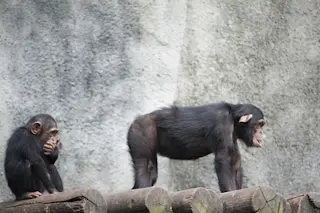(Credit: AJancso/Shutterstock) Chimpanzees may look at each other's butts the same way we look at faces. A pair of researchers from Leiden University in the Netherlands and Kyoto University in Japan studied how chimps process images of other chimps' rear ends, and found that they perceive them in the same way that we do faces. Chimps seem unable to recognize posteriors well when they are flipped upside down. Humans experience the same difficulty — what's called an inversion effect — when looking at faces.
Our ability to recognize faces is deeply ingrained in our consciousness, and seems to be present nearly from birth. Telling people apart from each other enables some of the most basic components of social interactions, so it makes sense that we come prepared to do so. How we use subtle clues to differentiate our mothers from complete strangers is still a point of debate, but it ...














